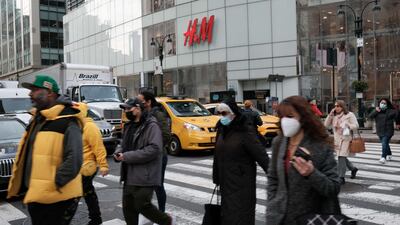It's become the conventional wisdom that the US economy is built on Americans' endless appetite to buy lots and lots of stuff.
Household consumption makes up about 67 per cent of gross domestic product. When the economy falters, we're told spending is our patriotic duty.
But suddenly, Americans can’t spend like they used to. Store shelves are emptying and it can take months to find a car, refrigerator or sofa. If this continues, they may need to learn to do without – and, horror, live more like the Europeans. That actually might not be a bad thing, because the US economy could be healthier if it were less reliant on consumption.
After all, Americans haven't always acted like this. We've entered an age of overabundance. We consume much more than we used to and more than other countries. Consumption per capita grew about 65 per cent from 1990 to 2015, compared with about 35 per cent growth in Europe. Household consumption makes up only about 50 per cent of GDP in Germany.
And these numbers reflect big changes in Americans' lifestyles. The average US home was 1,700 square feet in 1980, by 2015 it was 2,000 square feet, even though the number of people in the average household shrank. In 1980, 15 per cent of households didn’t have a TV, now only about 3 per cent don’t.
In 2015, 40 per cent of American households had three or more TVs, including 30 per cent of households earning less than $40,000 a year. In 1980, only 13 per cent of households had two or more refrigerators. In 2015, 30 per cent did – including many low-earning households.
Clothing purchases have increased five-fold since 1980 and the average garment will only be worn seven times before it's disposed of.
Our spending habits slowed during the pandemic but, despite all the shortages, they've come roaring back.
There are many reasons we’ve become a nation of shopaholics. We’ve become a richer country, which means we spend more. Many goods have become cheaper and more accessible. That's partly because of technology that makes production more efficient.
For shoppers, the internet makes it easier to find more goods for the best prices without even leaving their homes. The other big factor is we get more stuff from abroad, imports of goods and services as a share of GDP has nearly doubled since the 1980s.
Lots of trade has been with countries like China and Mexico, which have lower labour costs. Even American-made goods use parts that come from abroad.
We experienced the vulnerabilities of a global supply chain in the past few years, but when it does work (most of the time) it means the US can fully exploit the comparative advantages of trade and provide goods more efficiently, faster and for less money.
The pandemic revealed vulnerabilities of this hyper-efficient global market. Ports are backed up causing shortages – for the first time in many Americans’ lives.
The odds are that, eventually, the port issues will be resolved (we hope). But there are reasons to believe the age of overabundance is over.
Even before the pandemic, the US government offered more subsidies and imposed more tariffs to encourage companies to produce more goods domestically and the Biden administration wants to expand the effort to promote resiliency.
That may mean more goods are made in America, but over the long run less trade tends to mean less variety of goods at higher prices.
Meanwhile, the US economic relationship with China becomes more uncertain each day. If it deteriorates further, that also tilts the US towards less trade and fewer cheap goods. The future of trade is a big unknown, but if we turn inward, Americans won't be able to sustain the same levels of consumption.
Finally, if we are truly serious about protecting the planet, being a good global citizen will take more than driving an electric car or installing solar panels. It means consuming less so that we throw less away. Maybe that means getting by with only one refrigerator or avoiding fast, disposable fashion.
Americans tend to overspend or buy cheap substitutes rather than save up for longer-lasting, better-quality goods. That's a function of the accessibility of cheap goods, of having more space to store our purchases, and also of a culture where buying stuff feeds the empty parts of our souls.
European souls are not necessarily more fulfilled, they just find other, more eco-friendly ways to shut out the darkness – like going on a long bike ride.

